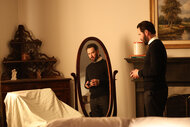What Causes Agoraphobia? Zeke’s Condition, Explained
Zeke Wallace, the cyber sleuth in NBC's new crime drama Found, is forced to use his crime-fighting skills from home due to a debilitating case of agoraphobia.
As a highly-accomplished IT guru, there isn’t much Found’s Zeke Wallace can’t do, but the savvy computer crime fighter does have one significant limitation.
After being kidnapped once himself, Zeke, played by Arlen Escarpeta, is agoraphobic and unable to leave his house. As a result, he helps Gabi Moseley and her crisis management team remotely from the confines of his apartment as they work to bring the missing home in the new NBC crime drama — airing Tuesdays at 10/9c and streaming the next day on Peacock.
But just what causes agoraphobia? To learn more about the condition, NBC Insider spoke with Karen Lynn Cassiday, PhD, the owner and managing director of Anxiety Treatment Center of Greater Chicago.
What is agoraphobia?
In Found, Zeke’s condition is so debilitating that the cyber sleuth is unable to leave his house, but according to Cassiday, that would be the “most extreme, severe” form of the anxiety disorder.
RELATED: Are Missing Person’s Crisis Firms Like the One Seen in Found Real? We Asked an Expert
The actual clinical definition encompasses a much wider range of possible limitations. “Agoraphobia involves fearing and avoiding places or situations that might cause panic and feelings of being trapped, helpless or embarrassed,” the Mayo Clinic explained.
According to Cassiday, to receive an agoraphobia diagnosis, a person must be afraid to do something because they are afraid of getting anxious or having a panic attack and that fear needs to interfere with their life in a negative way.
“The fear is always that I might have a panic attack. You know, that I would get intensely anxious and it would get out of control,” Cassiday explained.
As a result, she said the person accidentally attributes the situation as “being the cause of the anxiety” rather than realizing it is “their body and their mindset” responsible for the internal turmoil.
For example, someone with agoraphobia may be comfortable driving around their own city, but panic if they leave the city limits or only be able to go a certain number of miles from their home. Others may be able to function normally as long as they are carrying a pill bottle with a Xanax, even if they never use it, but would feel extremely anxious without it and wouldn't get out of bed. Or a person may feel they need their children or dog to go with them out in public.
In extreme cases like Zeke’s they could even be homebound.
“Then of course, the more you avoid [the trigger], the worse it gets,” Cassiday said.
What causes agoraphobia?
A common misconception, according to Cassiday, is that agoraphobia is caused by trauma. She said it’s more likely that it is caused by a combination of factors including genetics, childhood, and stress levels.
Research has indicated that people with agoraphobia typically have a genetic predisposition to developing an anxiety disorder of some form.
Cassiday said someone with agoraphobia may also have grown up in an “overprotective” environment, where authority figures in a child’s life may have made it seem “it’s bad for you to be upset or anxious” and also indicated that the world was a scary place and there was a lot to be afraid of.
“There’s a lot of intolerance of uncertainty and risk taking,” she said. “That we know really dramatically ups the odds for someone to have that.”
Finally, before the first episode of agoraphobia, Cassiday said it’s likely the person has experienced a “period of elevated chronic stress” and may not be getting enough sleep.
“In other words the person isn’t getting a chance to replenish and down-regulate and rest and so that precedes usually for six months before that first episode,” she said.
Agoraphobia is often more common in women and can begin to develop as early as the teen or young adult years. Another period where women may be more vulnerable for developing agoraphobia is in the early child-bearing years.
“We think one of the things that’s happening is there is lots of broken sleep, massive responsibility, there’s not as adequate role sharing in terms of you know, the child rearing, and that’s a stress environment that makes it happen,” she said.
How can you treat agoraphobia?
People with agoraphobia are often trying to avoid a panic attack. During an attack, Cassiday said someone might tense their shoulders, hunch their body and begin to breathe rapidly in what’s known as chronic hyperventilation.
"You accidentally over-exhale too much carbon dioxide. When that happens, your blood gets more alkaline. It creates all these bizarre physical sensations,” she said, adding it often sets off a flight or freeze reaction and makes the person feel dizzy or disoriented.
One of the ways to combat agoraphobia is by training people how to keep their CO2 levels up, which makes it more difficult to have a panic attack. A device known as a Respira can help a person learn to manage their CO2 levels.
However, for some people, that may not be enough to overcome their challenges. In those instances, practitioners often turn to exposure therapy, where a person practices putting themselves into the situation they are afraid of to desensitize themselves in what’s known as in vivo exposure.
“What happens is you get used to it,” Cassiday said. “You don’t have to flee, you don’t have to freeze up and you literally grow new dendrites in your brain and you make sort of new pathways by changing your behavior and then your body starts to go, ‘oh, this isn’t so bad’ and stops panicking.’
Another tool is interoceptive exposure where a practitioner may help a person bring on the physical sensations of a panic attack to teach the mind not to be afraid of the sensations.
RELATED: A Sinister Kidnapper, a Tough Missing Persons Expert — Meet the Cast of New NBC Drama Found
What role did the pandemic play for those with agoraphobia?
Cassiday believes more people may be developing agoraphobia or having trouble getting back to their regular lives after the pandemic. That’s in part because the pandemic created a series of unique situations that allowed people to spend more time at home, whether it was the uptick in home delivery services or the shift to working from home.
“We’re seeing, you know at least in the United States and Canada, people who are refusing to go back to work,” she said.
Often the reasons are not because someone believes they can do an adequate job at home, but because their “agoraphobia has become cemented and accidentally reinforced,” making the disorder much worse.
“That has played into the anxiety in a very unhelpful way and we’re seeing the same things happening with kids,” she said.
The good news is exposure therapy has proved to be very effective and can help those suffering from agoraphobia get back to their regular lives.
“To really recover you have to learn, ‘I can handle even the worst when I feel anxious’ and not be afraid of it,” Cassiday said.
To see how Zeke copes with agoraphobia, tune in to Found Tuesdays at 10/9c on NBC and streaming the next day on Peacock.



















